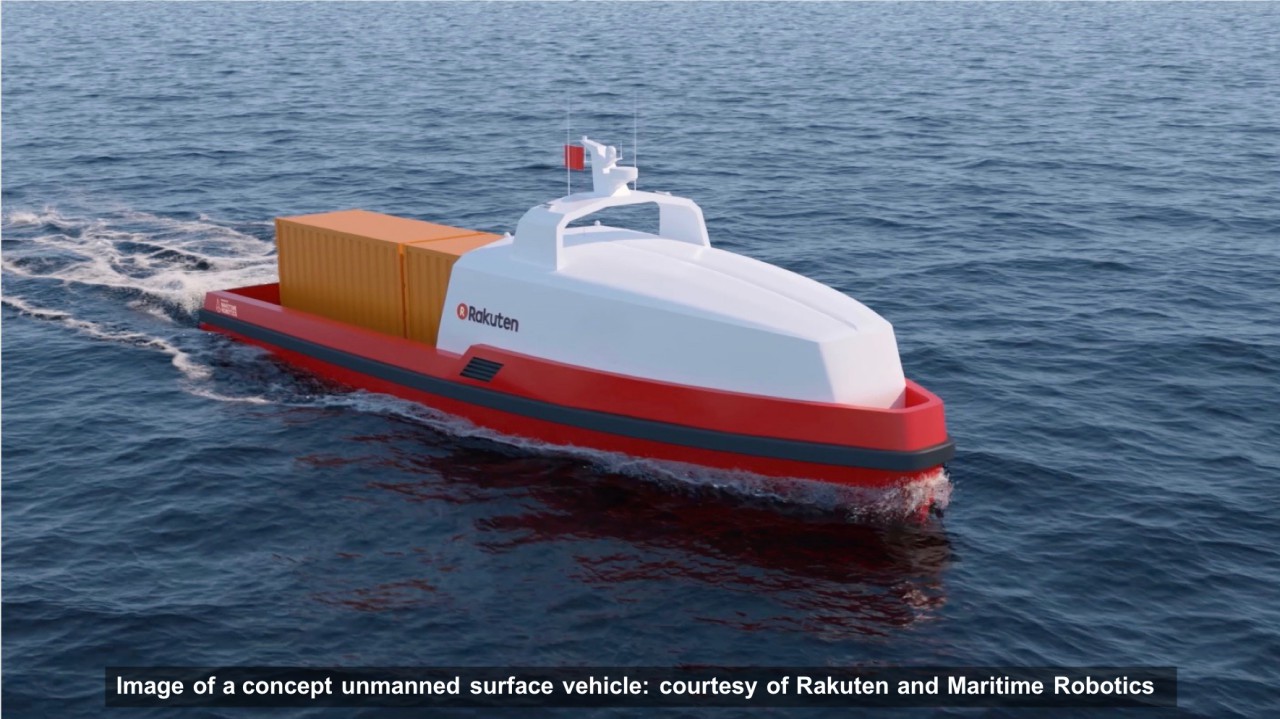Tokyo, March 13, 2018 – Rakuten Institute of Technology, the dedicated research and development organization of the Rakuten Group, and Maritime Robotics AS, a leading provider of innovative unmanned solutions for maritime operations, today announced that the two organizations have entered into an agreement to collaborate on research into unmanned cargo ships and related technologies.
Based on the agreement, the two organizations will leverage their strengths to jointly explore Unmanned Surface Vehicle (USV) technologies as a logistics solution, with Rakuten Institute of Technology focusing on the fields of computer vision and object recognition, decision making AI and logistic optimization, and Maritime Robotics focusing on autonomous control and sensor systems, communications and control room systems.
“USV technologies have the potential to revolutionize the way we think about the logistics chain,” commented Masaya Mori, Global Head of Rakuten Institute of Technology. “We are very pleased to collaborate with Maritime Robotics, a leader in technology and applications for unmanned surface vehicles, in order to explore the exciting potential of sea-based logistics.”
“Maritime Robotics has for the last decade been one of the few international pioneers on technology and application development on Unmanned Surface Vehicles (USVs). From our core-technology in robotics and control engineering, we have long seen that this technology had applications within autonomous transportation. We are very happy to partner with a global player like Rakuten to make this happen,” commented Vegard Hovstein, CEO of Maritime Robotics.
Currently, domestic logistics networks in Japan are centered around land-based transport, especially trucks. The truck industry requires massive amounts of manpower and large investment into infrastructure to accommodate the trucks, including roads, tunnels, bridges and gas stations. Trucks are also a major source of environmental congestion. This research collaboration aims to explore the potential of USVs to address these issues.
Unmanned ships can potentially operate independently, contributing to a reduction in operating costs and, while ships may have slower top speeds than their land-based counterparts, the freedom of navigation and autonomy allows for continuous operation, often improving the total logistic throughput. The use of sensor fusion and machine learning can also assist operators by providing better situational awareness and understanding, while AI assisted autonomy can reduce the workload on the operator. Combined with computer aided control, the reduced human involvement may in turn reduce the risk of accidents. Unmanned ships do not require the same level of infrastructure investment as trucks, and can potentially operate using current sea ports, docks and other existing maritime infrastructure. Ships have a longer lifespan than trucks, improving the reliability of the logistics chain.
Rakuten and Maritime Robotics hope that their collaborative research will contribute to revolutionize sea-based logistics in the same way drones and autonomous vehicles are expected to transform transportation in their respective fields.
- Rakuten, Inc.
- Maritime Robotics AS
Rakuten Institute of Technology and Maritime Robotics Agree to Collaborate on Research into Unmanned Cargo Ships
About Maritime Robotics
Maritime Robotics is a leading provider of innovative unmanned solutions for maritime operations in harsh environments. Founded in Trondheim, Norway in 2005, Maritime Robotics has developed technology for unmanned operation in air and on the surface for both civilian governmental and military partners. Focusing on high-quality systems and cost efficient solutions, Maritime Robotics has become a global marked leader on unmanned aerial and marine vehicles. Maritime Robotics has offices in 3 locations in Norway. For more information: https://maritimerobotics.com

